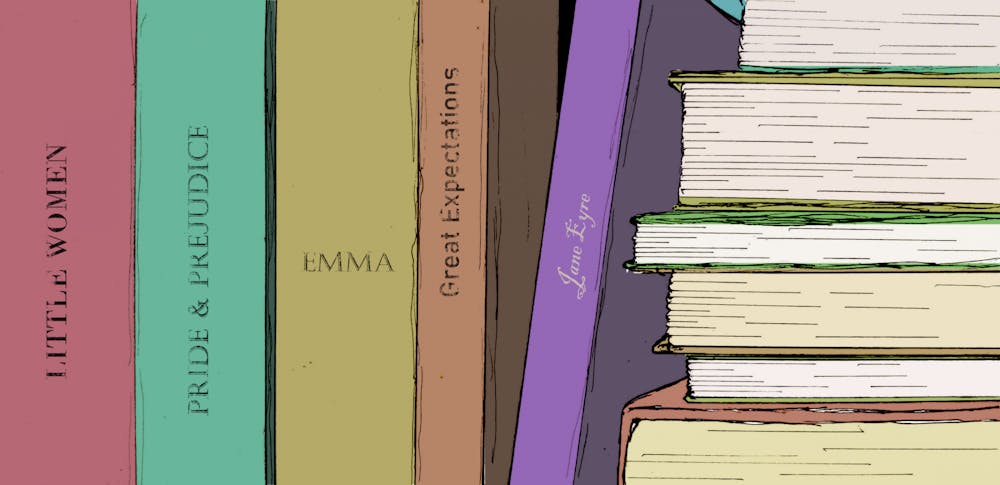Books deemed to be classics often have two things in common: They are old and may be hard to read. While aged stories can seem out-of-touch with the current world, they usually still contain important messages that transcend time. Or maybe these books are acclaimed for being amusing and interesting to the reader, regardless of deeper message.
Whatever it may be, I find there are few better ways to spend a winter break than wrapped up in a blanket reading a good book. Because classic literature is appealing for its reputability, but can be intimidating due to antiquated style, I have compiled a list of my favorite books that are worth reading:
“Pride and Prejudice” by Jane Austen
Despite the lofty title, this novel boils down to a classic enemies-to-lovers tale. The plotline follows Elizabeth Bennet, one of five daughters in the Bennet household. After news reaches the household of some wealthy newcomers in a nearby mansion, the family takes a fateful trip to visit the new occupants.
What follows is a warm greeting from Mr. Bingley, who catches the eye of Elizabeth’s sister, Jane. His greeting contrasts greatly with his friend Mr. Darcy, who is seemingly quiet and cold. While the introduction between Darcy and Elizabeth leaves them both feeling unfavorably toward each other, unforeseeable events lead their paths to intertwine as the two get to know each other better.
This novel covers the complexity of prejudice between social classes in a romance story that still holds up today.
“Jane Eyre” by Charlotte Brontë
Young orphan Jane Eyre lives with her abusive aunt and cousins after the death of her parents and uncle. Deemed too much of a burden, she is sent away to a strict school for orphan girls.
After working her way through school and securing a teaching position, Eyre wishes to leave and begin a new career. She is hired as a governess for the ward of the wealthy owner of Thornfield. When the typically absent owner, Mr. Rochester, comes back to pay a visit, mysterious events begin to transpire. An enigma himself, Rochester involves Eyre in the strange happenings.
“Jane Eyre” is full of twists and turns, making this novel a page-turner. The mystery surrounding the characters and events creates confusion as to what is really going on at Thornfield.
“Great Expectations” by Charles Dickens
This book tells the coming-of-age story of Pip, an orphan who lives with his kind uncle and harsh aunt. Pip is visiting his parents’ graves when he is confronted by an escaped convict who demands for food. A string of seemingly unrelated instances occur, with the rest of the book tying together how these are all connected.
As Pip grows up, he struggles with determining what is most important to him — family, love or money. He meets a variety of quirky, odd characters who influence his decisions and make him decide what he truly values.
The memorable characters alone make this novel worth reading. Besides this, the commentary on issues of social class and pride remain relevant throughout time.
“Little Women” by Louisa May Alcott
“Little Women” tells the story of the four March sisters as they grow up. Although from the same family, the sisters vary in goals and interests. Due to this, they each face difficulties unique to their own journeys, showcasing how economic and social standards can cause rifts and difficulties in relationships.
In their childhood, the March sisters befriend the grandson of their neighbor, Laurie. Growing up alongside the sisters, he becomes involved in their lives — at times complicating them.
This heartwarming tale combines the ups and downs of family relationships with the sometimes difficult journey toward self-discovery.
“Emma” by Jane Austen
The titular character, Emma Woodhouse, is a rich, spoiled woman who meddles in others’ relationships. A proud matchmaker, Woodhouse tries to set up couples amongst her friends, including her new, poor friend Harriet Smith.
When attempts at matchmaking fall apart, Woodhouse has to come to terms with her own feelings, as well as those who she has hurt with false hopes.
A satirical piece, “Emma” is full of hilarious, odd characters that make light of a snobby class of societal elites. Along with humor, this novel also captures how personal growth is an essential part of finding contentment.




